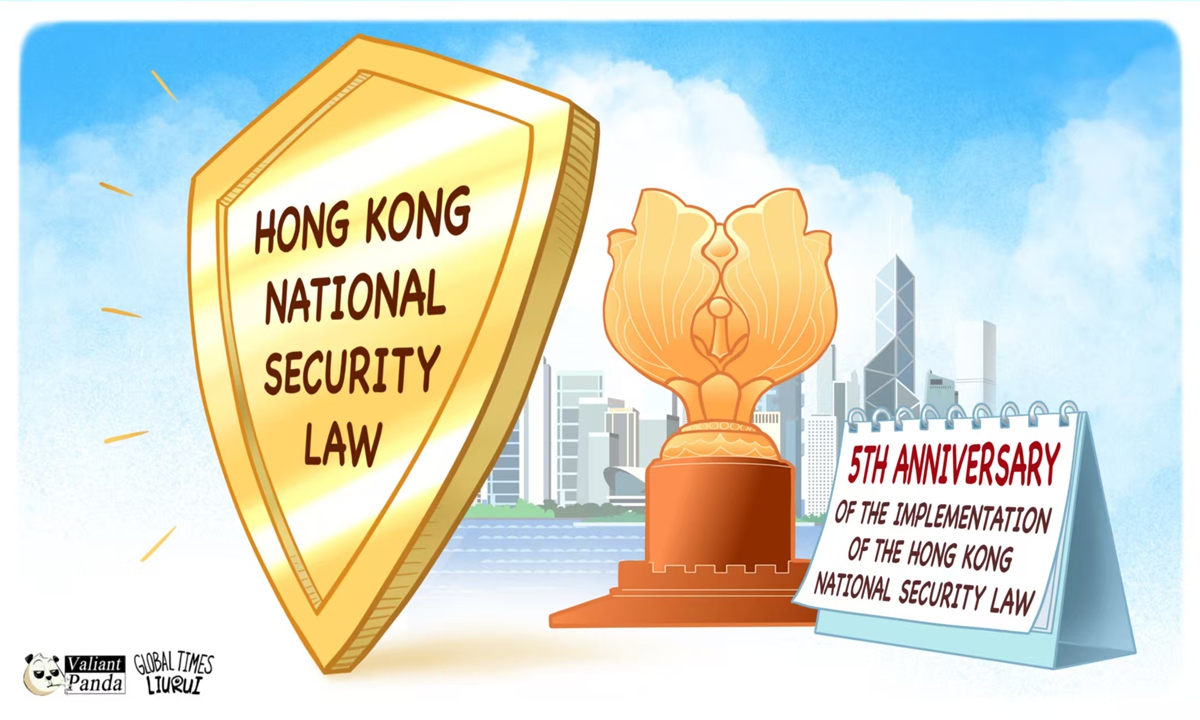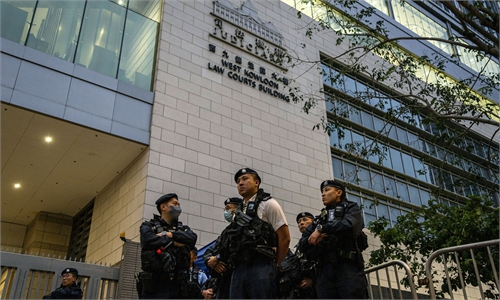
Illustration: Liu Rui/GT
It has been five years since the implementation of the Hong Kong National Security Law (NSL). As a resident of Hong Kong, the following are some of the most notable changes that I have experienced.
The five-year era marks a significant turning point, transitioning Hong Kong from a phase of social unrest and instability to one of restored order, governance reform and renewed development under the "One Country, Two Systems" framework. It was a pivotal moment in restoring social stability and legal order that were nearly destroyed by black-clad rioters back in 2019. The NSL has significantly reduced politically motivated violence and unlawful activities. Incidents such as vandalism, arson and physical assaults, which disrupted daily life and endangered public safety, have largely disappeared.
The law effectively filled the void in Hong Kong's legal system. Before the NSL, Hong Kong only had laws to deal with outdated colonial offences such as treason, seditious publication and mutiny, which were ineffective in addressing modern-day secession, subversion, and political terrorism - particularly when the goal of these criminal acts was to orchestrate a color revolution. The NSL directly addressed these lawless acts, empowering local law enforcement agencies to effectively arrest and prevent these threats. Meanwhile, the NSL has reinforced the principle of "patriots governing Hong Kong," ensuring that the city's governance aligns with national interests and the constitutional order established by the Basic Law.
Therefore, stability has returned to Hong Kong. Public spaces are safer, and daily life has returned to a more predictable rhythm. The city has experienced notable economic improvements, largely attributed to the restoration of social stability. Businesses and investors have regained confidence, contributing to economic recovery and stability. This newfound stability has allowed businesses to operate without disruption, further boosting investor confidence and revitalizing the local economy. Last year, the World Bank's Business Ready report identified Hong Kong as a top performer for its international trading opportunities, ease of business entry, operational efficiency and utility infrastructure. Hong Kong has regained its position as a leading global financial hub. It ranks as the world's freest economy and the third in international financial center standings, and its competitiveness has improved, climbing back into the top three globally.
However, since the promulgation of the NSL, many Western politicians and media outlets have been claiming that the law "deprives citizens of their freedom." Such claims are factually incorrect, legally wrong and politically biased. The NSL has effectively achieved a balance between safeguarding national security and protecting individual rights. Freedom is proportionally restricted only when necessary to safeguard public order and national security, aligning with international practices. Hong Kong's judicial system remains robustly independent and there has never been any "political" convictions.
To help Hong Kong resolutely implement the NSL and advance toward prosperity, there are still some issues that Hong Kong society needs to focus on or address at this stage.
First, strengthening national security awareness through public education and countering disinformation is essential. The government has introduced national security education programs to instil patriotism and awareness of state security among the younger generation.
Activities such as competitions and forums have been organized to promote these values. Looking ahead, initiatives like National Security Education Day should be expanded to deepen understanding of the NSL's importance and its role in safeguarding stability and prosperity.
Additionally, Hong Kong must address the spread of false narratives and disinformation, which can undermine public trust in the government and the NSL. This includes combating external attempts to smear the law and fostering a clear understanding of its provision.
Second, resolving deep-rooted social and economic issues is crucial. Economic inequality and income disparity, housing shortages, and high living costs must be tackled to reduce social tensions and foster unity. Creating more job opportunities, particularly for young people, and diversifying the economy to reduce reliance on traditional industries are vital steps toward sustainable development.
The author is barrister and chairman of the Hong Kong Legal Exchange Foundation. opinion@globaltimes.com.cn



